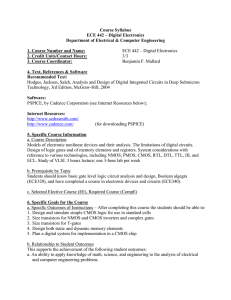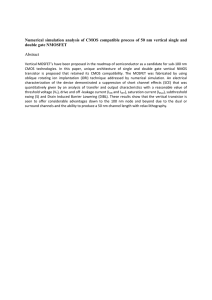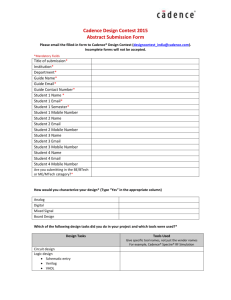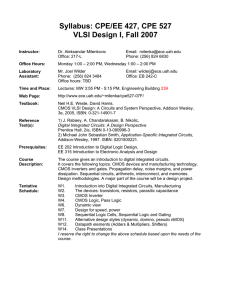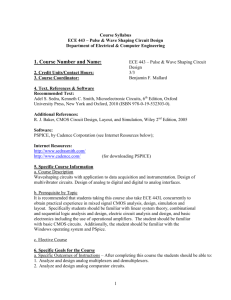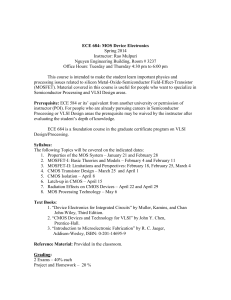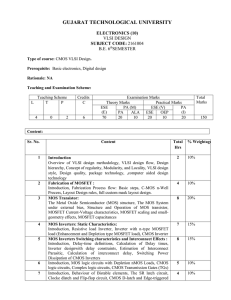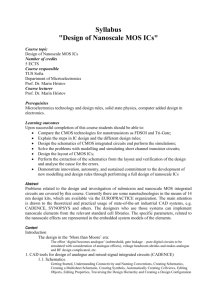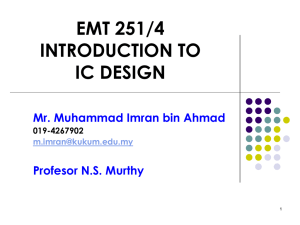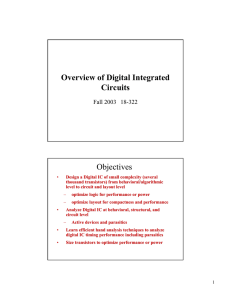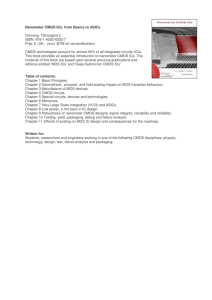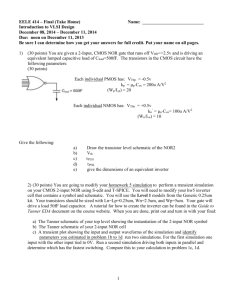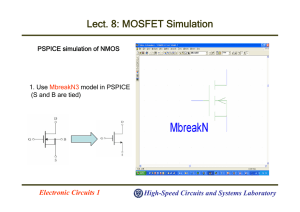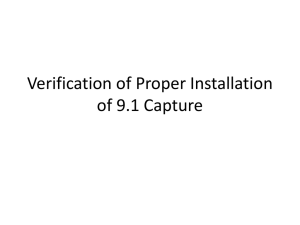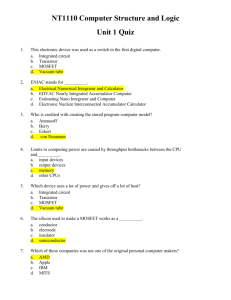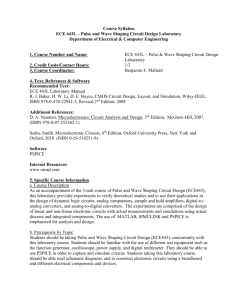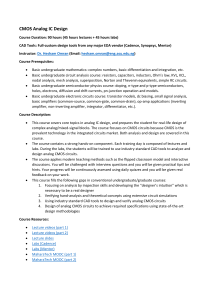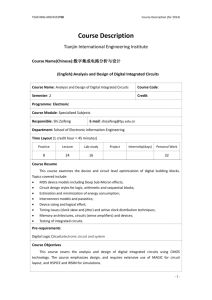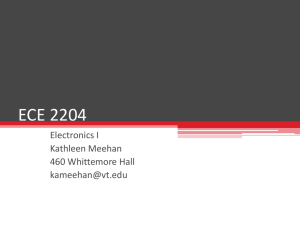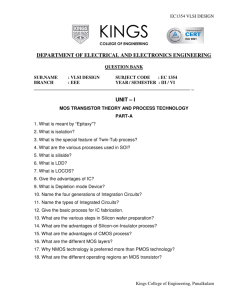ECE 442L ()
advertisement
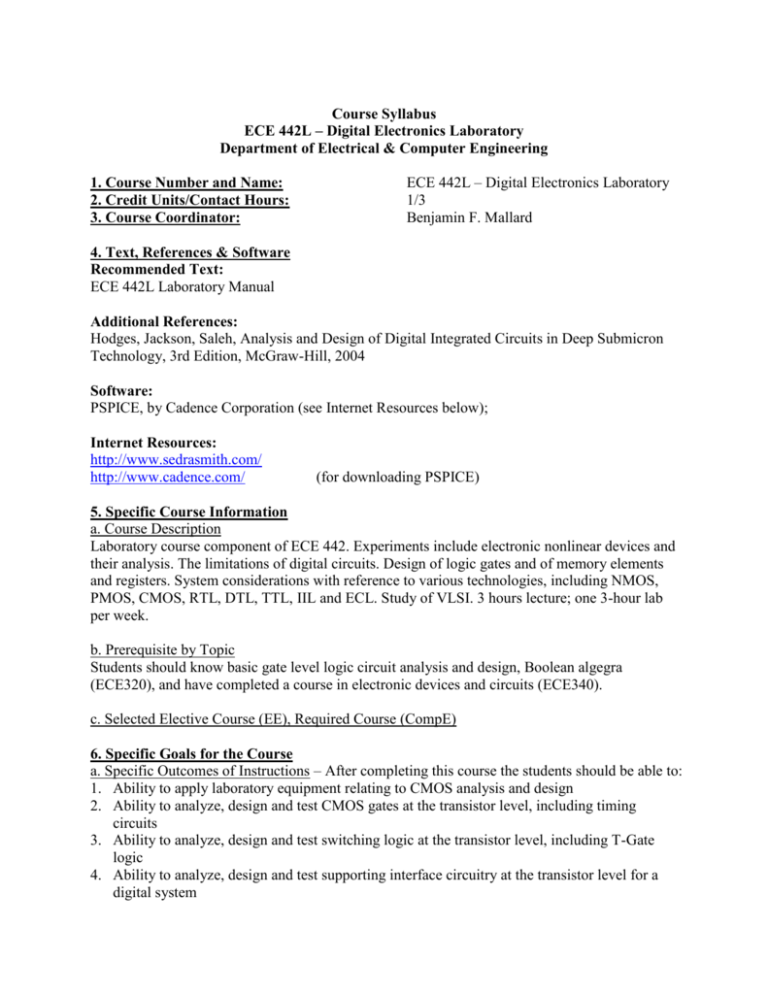
Course Syllabus ECE 442L – Digital Electronics Laboratory Department of Electrical & Computer Engineering 1. Course Number and Name: 2. Credit Units/Contact Hours: 3. Course Coordinator: ECE 442L – Digital Electronics Laboratory 1/3 Benjamin F. Mallard 4. Text, References & Software Recommended Text: ECE 442L Laboratory Manual Additional References: Hodges, Jackson, Saleh, Analysis and Design of Digital Integrated Circuits in Deep Submicron Technology, 3rd Edition, McGraw-Hill, 2004 Software: PSPICE, by Cadence Corporation (see Internet Resources below); Internet Resources: http://www.sedrasmith.com/ http://www.cadence.com/ (for downloading PSPICE) 5. Specific Course Information a. Course Description Laboratory course component of ECE 442. Experiments include electronic nonlinear devices and their analysis. The limitations of digital circuits. Design of logic gates and of memory elements and registers. System considerations with reference to various technologies, including NMOS, PMOS, CMOS, RTL, DTL, TTL, IIL and ECL. Study of VLSI. 3 hours lecture; one 3-hour lab per week. b. Prerequisite by Topic Students should know basic gate level logic circuit analysis and design, Boolean algegra (ECE320), and have completed a course in electronic devices and circuits (ECE340). c. Selected Elective Course (EE), Required Course (CompE) 6. Specific Goals for the Course a. Specific Outcomes of Instructions – After completing this course the students should be able to: 1. Ability to apply laboratory equipment relating to CMOS analysis and design 2. Ability to analyze, design and test CMOS gates at the transistor level, including timing circuits 3. Ability to analyze, design and test switching logic at the transistor level, including T-Gate logic 4. Ability to analyze, design and test supporting interface circuitry at the transistor level for a digital system 5. Ability to design and test a digital system suitable for inclusion in a single chip b. Relationship to Student Outcomes a. An ability to apply knowledge of math, science, and engineering to the analysis of electrical engineering problems. b. An ability to design and conduct scientific and engineering experiments, as well as to analyze and interpret data. c. An ability to design systems which include hardware and/or software components within realistic constraints such as cost, manufacturability, safety and environmental concerns. e. An ability to identify, formulate, and solve electrical engineering problems. g. An ability to communicate effectively through written reports and oral presentations. k. An ability to use modern engineering techniques for analysis and design. m. An ability to analyze and design complex devices and/or systems containing hardware and/or software components. 7. Topics Covered/Course Outline 1. MOSFET based inverters and gates. Design, Simulation, Construction and Test 2. CMOS timers and clock generators. Design, Simulation, Construction and Test 3. MOSFET based Current Mirrors. Design, Simulation, Construction and Test 4. MOSFET based Active Loads. Design, Simulation, Construction and Test 5. MOSFET based Utility Amplifier. Design, Simulation, Construction and Test 6. CMOS Digital Project, Simulation, Construction and Test Prepared by: Benjamin F. Mallard, Professor of Electrical and Computer Engineering, March 2013 Ali Amini, Professor of Electrical and Computer Engineering, March 2013
